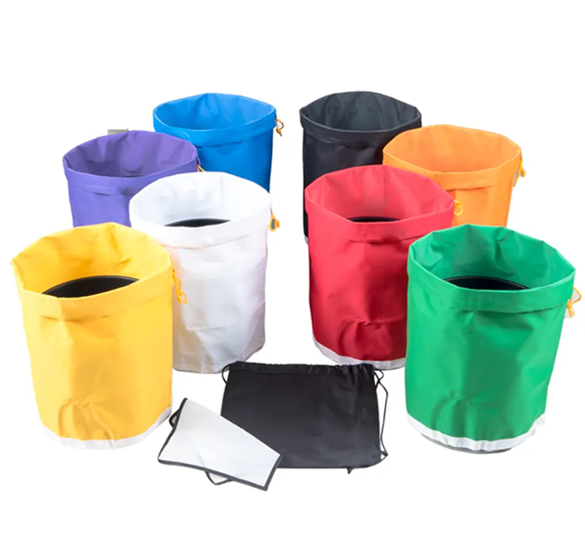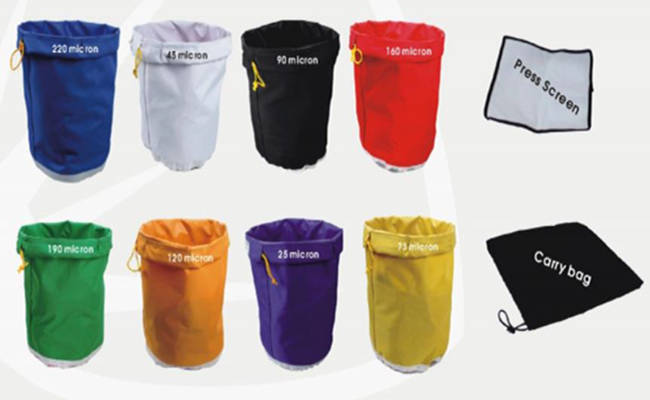Why does Jingda Mesh Filter Bags use different micron size bubble wash bags?

When ice water and cannabis material are mixed together, the trichome heads break away from the plant material and float in the water.
But the trichome heads weren't the only things breaking free in the water.
Hairy stems and small pieces of plant material can also be loose and need to be filtered out.
Without this filtration, contaminants may end up in the finished product.
Collected at the top of each screen is a hash of one grade or another. Hash that is almost entirely full hair without stems is the highest grade hash.
The lowest grade hash consists of only partial trichome heads, stem fragments, and tiny plant material.
The highest quality bubble hash bags includes almost the entire mature trichome head. Therefore, the bubble wash bag with the mesh closest to the diameter of the trichome head will collect the highest grade of hash.
Normally Bubble hash bags have 8 microns.
They include 25 45 73 90 120 160 190 220 Micron.
Different micron have different usages.
Please check below details:

220 micron bubble cleaning bag: the main working bag
This bag has the widest porosity and therefore allows the passage of the largest sized material.
Trichome heads, trichome stems, and small pieces of plant material are all able to pass through this screen.
The filter captures larger plant material, providing the first stage of filtration after the ice water is mixed with the cannabis.
Material collected in the main work package is not worth keeping due to its poor quality.
190 microns bubble hash bags: Cleaning bag
The 190 micron air bubble wash bag is the next level of filtration and pulls out more plant material as the ice water slurry passes through. The trichome heads are small enough to pass through this screen, so the material collected on this screen is usually not worth keeping. This bubble bag offers extra sophistication but is not collectible.
160 Micron Bubble hash bags: Contaminant Removal Bag
The bag filters smaller contaminants from the water, but also allows most intact trichome heads to pass through. However, there will still be trichomes and trichome stems trapped in this filter.
120 microns bubble hash bags: Trichome collection bag
This is the first package that will generate some noteworthy hashrates. The previous filter caught chunks of plant material, so most of it was already sifted out of the water. What remains on top of the 120 micron screen are the trichome heads (and often the attached stem) and some light contamination.
90 microns bubble hash bags: Trichome collection bag
You can get some of the best hash out of a 90 micron bubble bag.
The dimensions of this filter closely match the dimensions of a fully mature trichome head, excluding stems. There won't be much plant contamination on this screen either.
73 microns bubble hash bags: Trichome collection bag
A 73 micron bubble hash bag will collect the highest grade hash as it is closest to the size of a full, mature, intact stemless trichome head.
Very little plant contaminants should be collected in this filter, as most of the contaminants should have been filtered out of the water by the previous screen.
45 µm bubble hash bags: Trichome collection bag
Most of the intact trichome heads that make up a good hash have been filtered from the water, but parts of the heads and stems still collect on the filter. Not great quality, but still worth keeping for consumption or mixing with flowers for smoking.
25 microns bubble hash bags: Trichome collection bag
The last and best filter will contain some grade of hash that can be used for making food, but usually not of good quality to apply on its own or even pressed into rosin. Some extractors will put the collected material in a filter, but as always, you should experiment with your variety and see what you get.
Contact: Jingda Filter Bags
Phone: +86 15100134172
E-mail: alice@jingdameshfilterbag.com
Add: No.20 Heping Road, Chang'an District, Shijiazhuang City, Hebei Province, China.